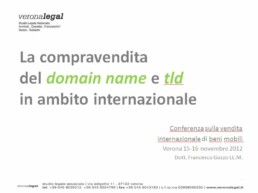[:en]CJEU: cancelled flight? Obligation to assist passengers.
[:en]The Court of Justicewith the judgment of 31 January 2013 in Case C-12/11, expresses itself once again on the issue of compensation for damage caused by delays and inconveniences to airline flights.
It is recalled, briefly, that with the Judgment of 23 October 2012, No. 629/10the Court held that, in the case of a passenger disembarking with a delay of three hours after the scheduled timethe parameters of damages dictated by EC Regulation No. 261/2004 apply. flat-rate compensation of between 250 and 600 eurosin the event of flight cancellation.
The judgment of 23 October also specified that compensation cannot be claimed if the air carrier proves that the delay was caused by extraordinary circumstances, which could not have been avoided even if all reasonable measures had been taken, i.e. circumstances beyond the air carrier's actual control.
In the judgment under review, the Court of Justice specifies on this point that, even in the event of force majeure, companies are not exempt from theobligation to provide assistance to stranded passengers. Therefore, even if the flight is cancelled due to exceptional circumstances such as the closure of the airspace - in this case the eruption of the Icelandic volcano Eyjafjallajökull - the carrier is still obliged to assist passengers without any time or money limitations by providing them with accommodation, meals and refreshments.
Moreover, the Court emphasises that, when the air carrier has not fulfilled its obligation to provide assistance to the passenger, the latter may obtain, only the reimbursement of such sums as are necessary, appropriate and reasonable.
[:]
Late Disciplinary Notice? Reintegration of the worker.
[:en]The Court of Cassation, with the recent Judgment No. 1693 of 24.1.2013 affirmed a rather relevant principle of law in the field of labour law. Specifically, it stated that in the case of disciplinary dismissal for just causeinfringements must be contested by the employer in the immediacyof their commission.
La failure to contest was, therefore, considered by the Supreme Court as a "tolerated behaviour'. Indeed, the aforementioned Article 7 of the Workers' Statute explicitly states that: "the employer may not take any disciplinary measure against the employee without having first notified him of the charge and without having heard his defence".
[:]
Concordato preventivo: the new requirements for admission to the procedure.
[:it]The debtor may now limit himself to filing the application containing the mere insolvency petition, reserving the right to submit the proposal, the arrangement plan and the necessary documents after the filing.
As is well known, the government on 7 August 2012 enacted into law the so-called "Development Decree".
Several novelties have been introduced, but in any case, this short article will analyse a single legislative change in the area of fallimentarand is of particular interest. Indeed, the reform has changed the requirements for admission to the arrangement procedure. Specifically, the debtor may now limit himself to filing the appeal containing the mere insolvency petition, reserving the right to submit the proposal, the arrangement plan and the necessary documents after the filing of the appeal. The term for such filing is fixed by the court and is between 60 and 120 days. It is also recalled that this deadline can be extended, but by no more than 60 days.
Concerning the effects of filing an appeal, please note that following its publication in the commercial register and until the decree of approval of the composition agreement becomes final, creditors may not commence or continue any enforcement or precautionary enforcement of the debtor's assets, under penalty of nullity. Moreover, if judicial mortgages have been registered in the 90 days preceding the publication of the appeal, they are ineffective against creditors prior to the arrangement. In practice it is sufficient to file an application for admission to the arrangement procedure with the competent court in order to produce the effects under Article 168 of the F.L., i.e. the blocking of enforcement actions. The business plan, on the other hand, can be presented in the following months.
This reform was put in place in order to protect companies in crisis, given the difficult economic situation faced by many companies. As a result of this new legislation, it will be, overcome the use of the technique employed by the concordat companies in order to shield the debtor's assets, i.e. that to establish a destination vicolo on the assets pursuant to Article 2645 ter of the Civil Code, in favour of the creditors of the arrangement, during the period necessary to prepare the plan and file the appeal.
Finally, it should be noted that this technique had recently been made more uncertain, especially following a ruling of 13.3.2012 by the Court of Verona, in which it declared that "the plan of composition cannot be considered feasible where the debtor, prior to filing the application, has established a restriction on its immovable property pursuant to Article 2645-ter of the Civil Code for the declared purpose of avoiding that the disorderly seizure of the assets of the company in crisis may result in a dispersion of value to the detriment of the creditors and prevent an equitable distribution of the effects of the insolvency".
[:]
Jurisdiction for contracts concluded on the Internet by the consumer.
[:en]What happens if one concludes a contract on the Internet, through a foreign site, and, following the conclusion, one finds problems with the contract concluded?
Which judge should I turn to? Who has jurisdiction. Read more
Innovative start-ups. Registration by 17 February 2013.
[:en]It is now official that from 19.10.2012 with the publication of the Development Decree bis in the Official Journalthe existence of incentives for innovative start-upsas included in the otherwise known as Growth Decree.
The requirements for registration are briefly listed in the commercial register site:
- corporation of Italian law whose shares or quotas representing the share capital are not listed and in which the majority of shares or shares are held by natural persons;
- are not operational since more than 48 months;
- carry out business activities in italy;
- annual production does not exceed the EUR 5 million;
- do not come distributed the profits;
- concerns thetechnological innovation of innovative products and services with high technological value;
- was not formed by a company merger/division or by the transfer of a branch of business;
- invests at least 20% of the greater value between cost and total value of production in development, or employs doctoral or post-doctoral researchers as employees or collaborators, or holds or files patents for industry and biotechnology;
Concerning facilities the law no. 221 of 17 December 2012 established for, with the intention of facilitating registrationa series of exemptions aimed at setting up and registering the company in the commercial register, tax benefits, as well as exemptions at company law and specific discipline in labour relations in the enterprise.
They remember:
- that the start-up is raised by the payment of stamp duty and secretarial fees due for entry in the commercial register as well as payment of the annual fee due to the chambers of commerce;
- has the right to hire staff with fixed-term contracts of minimum duration of 6 months and maximum duration of 36During this time, contracts may also be of short duration and renewed several times. At the end of 36 monthsthe contract may not be renewed any further, if not the last of 12 months thus bringing the amount of the contract to 48 months. After this period, the employee may only continue working in the start-up with an open-ended contract;
- i start-up collaborators may be remunerated by means of stock optionsand external service providers through the work for equity
- can benefit from priority access to facilitations for the recruitment of highly qualified personnel;
- were then tax incentives activated for investments in start-ups deriving from companies and individuals for the years 2013, 2014 and 2015;
- by theIce Agency has ordered assistance in the field regulatory, corporate, tax, real estate, contractual and credit issues, free-of-charge hospitality at major international trade fairs and events, and activities aimed at facilitating the meeting of innovative start-ups with potential investors for early stage and expansion capital.
[:]
The detachment from the network. A quantifiable detachment?
[:it]If a citizen remains without connectionand, can you claim damages from the telephone company?
This question was answered by the Justice of the Peace of Trieste with a recent ruling (GdP Trieste 30/7/2012 no. 587).
The case involved a family that was left without an ADSL connection for four months, who turned to the Justice of the Peace in order to claim compensation for the damages suffered. The judge ruled on the point, stating that "case law has long been oriented towards the view that the disconnection or failure to connect the telephone and Internet line constitutes pecuniary damage and existential damage for the contract holder and his family, damage considered particularly serious in an age when communication is fundamental to every aspect of daily life."
On the basis of this reasoning, the Judge has thereforeliquidated pecuniary damage resulting from non-fulfilment (having left the family disconnected for 4 months) by stating: "such a breach, although not precisely quantifiable economically, fulfils the conditions of thecan be fairly valued at € 1,600.00. "
The judge continued in his reasoning, also recognising the damage from "digital divide", i.e. damage of an existential nature characterised by the citizen's exclusion from the network. The lack of access to connectivity services generates, compromises the relational sphere, realising activities and different life habits.
On this point the Judge: 'somewhat difficult to carry out daily activities, difficulties constituting a prerequisite for granting the plaintiff compensation for the existential damage suffered as a result of the breach of contract by the telephone operator ....The assessment of the damage in the absence of objective criteria must be determined equitably at €800.00"
[:]
Mum, the plane is late!
[:it]
What happens if the plane lands with a significant delay? Is the passenger in any way entitled to a damages?
These questions were recently answered by the European Court of Justice, which ruled in the Judgment of 23 October 2012, No. 629/10that in the event of passenger disembarkation with a three-hour delay after the scheduled timethe latter is entitled to request the lump-sum compensation scheduled for the cancellation of the flight.
See on this point the EC Regulation No. 261/2004 which provides that, in the event of flight cancellation, passengers may receive lump-sum compensation of between EUR 250 and EUR 600.
The above principle makes application of what has already been established at Sturgeon judgment of 19/11/2009in which the Luxembourg courts held that passengers of delayed flights can be assimilated to passengers of cancelled flights as regards their right to compensation.
It is clear that compensation cannot be claimed if the air carrier proves that it was caused by extraordinary circumstances that could not have been avoided even if all reasonable measures had been taken, i.e. circumstances beyond the air carrier's actual control.
[:]
The digital work. A horror for our legal system?
[:it]More and more often we speak of 'digital work"whose meaning seems to be increasingly understood by users, without that there is, indeed, a real and effective feedback from the legislator.
In fact, as is well known, a digital work is understood to be an intellectual work that is characterised by the fact that it contains a so-called "corpus mysthicum" (such as originality, creativity, the
characteristics of innovativeness; therefore intangible connotations) and not having a "corpus mechanicum"(think for instance of the musical score or the traditional sheet of paper on which a work is written).
It is important, on this point, to remember that the digital work, precisely because of its entirely immaterial connotation, must not be confused with the CD/DVD containing multimedia files. Rather, the work is identified precisely in the files it contains, i.e. in a set of electrical impulses expressed in binary code.
It is important, on this point, to differentiate digital works in the strict sense, from the digitised works"(i.e. the simple DVD or CD, inside which digital files are imprinted and stored). In these cases, in fact, the physical format has a strong influence on distribution and musical, editorial and audiovisual works, already fully protected, are transported in digital format for distribution reasons.
Classic exampleTherefore, a digital work is the digital photograph and/or video, not necessarily being associated with a paper reproduction.
It goes without saying that the problems associated with the relationship between copyright and digital works are obviously enormous. Given the ease with which a person can 'take possession' and use a digital work of a third party through the use of the web.
Our legal system, however, has not yet defined the term 'digital work' in copyright law, and has not yet had the opportunity to regulate such disciplinedespite the fact that they have been needed for years.
[:]
Internet jurisdiction? The Court of Justice gives an answer to this 'international intrigue'.
[:en]Published on 25.10.2012 a very important judgment of the Court of Justice which resolved an issue that had been open for several years. In fact, the European court was asked to decide on the possibility of an EU citizen, to be able appeal to the courts of the State in which it has its centre of interestsin order to claim compensation for the damage caused by the violation of one's rights to the person, by means of content placed on the web by a third party, via a website.
The Court was called upon to decide on two very similar issues:
- the first case had seen a German citizen, who had previously been convicted of murder and was later admitted to probation, apply to the German court for damages for content put online by an Austrian company, which infringed his personal rights;
- in the according toSimilarly, a French citizen sought an order to pay a sum of money against an English online newspaper that had published untrue information about him.
The Court of Justice, called upon to rule on these disputes, stated that there is the alternative course of action:
1. in the courts of the Member State where the person who has published the damaging content is established;
2. in the place where the injured party finds its centre of interest;
3. before the courts of any Member State on the territory of which anetworked information is accessible or has been accessible.
The judgment reasoned its decision on the basis of Article 5(3) of the Regulation (EC) 44/2001regulating, among other things, jurisdiction in the European context.
This rule, in fact, states that 'a person domiciled in one Member State may be sued in another Member State in matters relating to tort, delict or quasi-delict, in the courts for the place where the harmful event occurred or may occur. "
Very interesting this judgement and certainly not insignificant, which gives certainty in another situation of violation of personal rights in the field meta-territorial, i.e. through the use of the web platform.
[:]
Speech at the conference on the international sale of movable property.
[:en]On 15.11. on the occasion of the conference on the international sale of movable property in the Aula Magna of the University of Verona, I had the pleasure of briefly presenting a topic that I have already dealt with in the following articles: the sale of the domain name e tld (internationally).
If it is of interest to you, here are the slides of the conference.[:]









